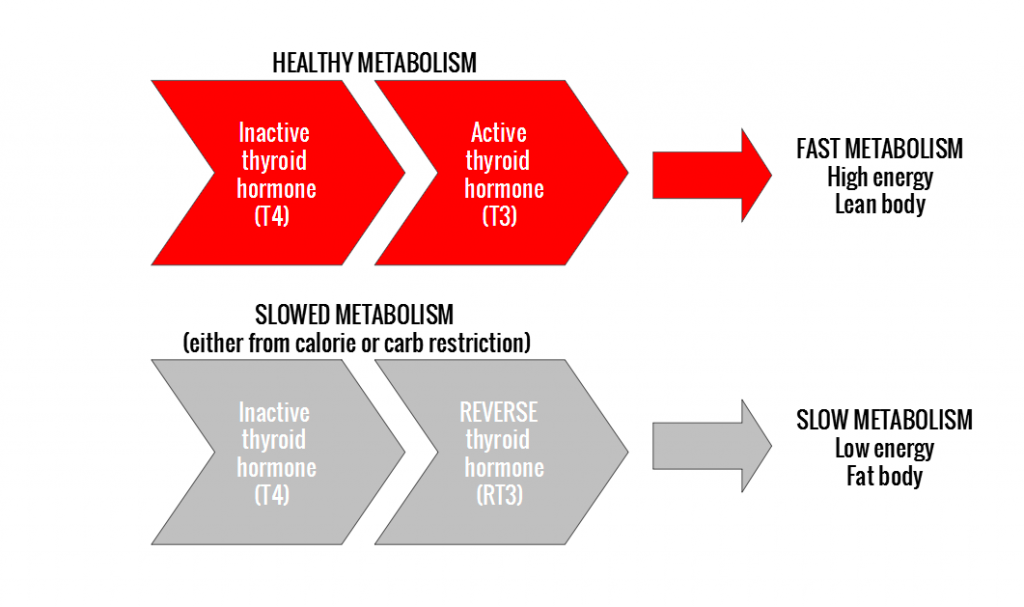7 Nasty Effects of Low Carb Diets
2. Decreased performance: Plain and simple, carbs provide energy to do stuff. They play an active role in hormonal balance as well, stimulating different metabolic pathways. Low carb diets increase the risk of “low T3 syndrome”, where T3, a thyroid hormone, controls metabolic rate, energy, and weight control. Low T3 caused from low carb and/or sever calorie restriction can cause fat gain and chronic fatigue. Low carb diets have shown to drop T3 almost as fast as starvation as well as reducing testosterone, increasing cortisol (stress hormone associated with weight gain), and causing amennoreah — all leading to reduced performance.
3. No added benefit: Studies have shown that low carb high fat (LCHF) diets have no significant benefit over a moderate carb moderate fat diet as the main factor in weight loss is being in a calorie deficit (See HERE and HERE). Surwit and colleagues compared the 6-week effects of 2 hypocaloric diets – one with 43% of the total calories as sucrose (table sugar), and one with 4% of the total calories as sucrose [15]. No significant differences were seen in the loss of bodyweight or bodyfat between the high and low-sucrose groups. Strengthening these results was the use of dual X-ray absorptiometry (DXA) to measure body composition. Furthermore, no differences in blood lipids or metabolism were seen between the groups. Seems like a more sugary intake still cannot override a calorie deficit. Now, while I can see the slight benefit in easier blood sugar control on a low carb diet (what diabetic wouldn’t want that) I cannot see sacrificing performance, energy, and mental ease that moderate carb diets bring. Why remove a nutrient that doesn’t need to be removed?
4. Less adherence: Paired with increased hunger, low carb diets restrict choices more so than the balance macronutrient diet, making it harder to go out with friends and eat as well as just enjoy life. Being worried about your carb intake is annoying (ask any diabetic). You are far more likely to cheat and not adhere to the protocol of a low carb diet. Long term adherence with low carb diets is also reduced compared to a moderate carbohydrate diet and are associated with several adverse metabolic and emotional effects. As far as diabetics on low carb diets— come on. You know you have those low blood sugar attacks and in 10 minutes turn your low carb diet into a high carb diet, raiding the kitchen like there is buried treasure (aka cookies). Having little play room with carbs is rough for anyone— especially diabetics.
5. Muscle loss: Low carb diets are often associated with muscle loss. Building muscle, which is the entire reason we go to the gym, helps increase your metabolism, improves your health, and increases strength. Losing muscle mass can lower your metabolism and actually cause you to gain more fat. Carbs have a protein sparring effect and reduce muscle catabolism or breakdown (along with resistance training and a few other factors). A Netherlands study measured 3 types of diets: 1) high carb 2) moderate carb 3) low carb. 1) and 2) experienced no t3 decrease Reverse t3 increase but 3) did. 3) also tested positive for an increase in urinary nitrogen showing protein breakdown aka muscle degradation aka losing gains. Decreasing muscle mass can increase your body fat!
6. Often uncontrolled: Let’s be honest— most people aren’t aware of how many calories they need to consume optimally based on their goal and activity level. When people choose a low carb diets it is usually because they think it is the magic diet that will fix being overweight quickly. Being unaware of what you personally need to consume based on your basal metabolic rate and non exercise thermogenesis (NEAT) means your diet is a shot-in-the-dark guessing game. Relying only on consuming very little carbs can cause severe under or overeating, keeping you from reaching your goals. I don’t know about you but I hate guessing, and while we can’t know our exact metabolic rate, we can use the tools backed by science to get pretty damn close, yielding consistent, controlled results.
7. False positive: The low carb false-positive gets people hooked. Within the first week of low carb diets, people lose 3-5lbs and rejoice like they’ve won the lottery. Whenever there is a significant carbohydrate consumption change, i.e. increasing or decreasing carbs, there will be a weight change— a water weight change. Body fat did not decrease. There was no upset in science. Just a water weight change. As I write about in my ebook “The Art of Losing Body Fat: Starving Yourself Fat” people generally don’t want to lose weight they want to lose body fat. Seeing the scale say 97lbs but you still aren’t happy with your body is not the goal.


